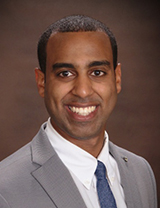 I am pleased to announce Paulos Mengsteab, a graduate student in the Institute for Regenerative Engineering, has received funding from a NIH/NIAMS supplemental grant which will support his Ph.D. studies. This supplemental grant to our current NIH R01 grant, “A Translational Approach to Ligament Regeneration,” evaluates the efficacy of surface modulation of a previously established 3D braided biomimetic tissue-engineered scaffold.
I am pleased to announce Paulos Mengsteab, a graduate student in the Institute for Regenerative Engineering, has received funding from a NIH/NIAMS supplemental grant which will support his Ph.D. studies. This supplemental grant to our current NIH R01 grant, “A Translational Approach to Ligament Regeneration,” evaluates the efficacy of surface modulation of a previously established 3D braided biomimetic tissue-engineered scaffold.
The Research Supplements to Promote Diversity in Health-Related Research Program supports the NIH’s efforts to diversify research fields. Specifically, it recruits individuals from underrepresented racial and ethnic groups, those with disabilities, and individuals from disadvantaged backgrounds. The program fosters improvements in the quality of educational environments, broaden perspectives in research priorities, and improve the nation’s capacity to address and eliminate health disparities.
Paulos graduated with a B.S. in Mechanical Engineering from the University of Missouri-Columbia in 2013. While studying for his degree, Paulos founded a student organization called ‘Step In’ which worked with the Columbia Public Schools in closing the educational achievement gap among races by encouraging underrepresented minorities and disadvantaged students, through applied learning modules, to participate in the STEM fields. Paulos was also selected to participate in the Ronald E. McNair Scholar’s Program and was awarded funding to conduct research under the supervision of Dr. Ahmed Sherif El-Gizawy’s. After graduating, he was awarded the NIH Post-Baccalaureate Education Program Fellowship at the University of Washington, where he conducted research in the Biomedical Engineering Department under the supervision of Dr. Doek-Ho Kim. His primary research project at University of Washington focused on primary cardiomyocytes contractile behavior in response to dynamic nanotopography surfaces. In Fall 2014, Paulos joined the Institute for Regenerative Engineering as a Ph.D. student enrolled in the Biomedical Engineering program at the University of Connecticut.

 I am pleased to announce Paulos Mengsteab, a graduate student in the Institute for Regenerative Engineering, has received funding from a NIH/NIAMS supplemental grant which will support his Ph.D. studies. This supplemental grant to our current NIH R01 grant, “A Translational Approach to Ligament Regeneration,” evaluates the efficacy of surface modulation of a previously established 3D braided biomimetic tissue-engineered scaffold.
I am pleased to announce Paulos Mengsteab, a graduate student in the Institute for Regenerative Engineering, has received funding from a NIH/NIAMS supplemental grant which will support his Ph.D. studies. This supplemental grant to our current NIH R01 grant, “A Translational Approach to Ligament Regeneration,” evaluates the efficacy of surface modulation of a previously established 3D braided biomimetic tissue-engineered scaffold.